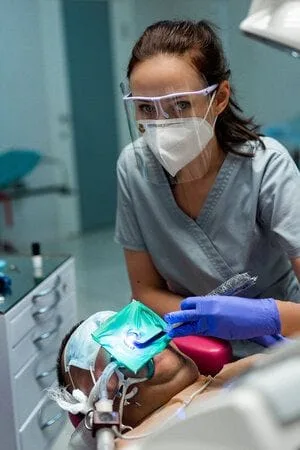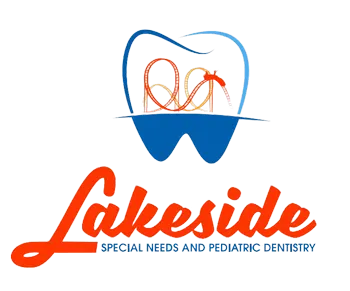
*We're one of the only offices that offers the entire range of in-house anesthesia services!
Sedation Dentistry for Kids, Special Needs Kids and Adults
We are one of the only dental offices to offer the entire range of in-house anesthesia services! Everything from conscious sedation to outpatient general anesthesia.
Sedation Dentistry relaxes anxious patients so critical dental work can be safely performed. It can be ideal for special needs patients of all ages, or children anxious about their dental work.
Sedation Dentistry: Conscious sedation to outpatient general anesthesia it’s all here.
Lakeside Special Need and Pediatric Dentistry is one of the only dental offices to offer the entire range of in-house anesthesia services! From conscious sedation to outpatient general anesthesia.
Remaining website page copy as on website page https://www.lakesidekidsdentis...
CONSCIOUS SEDATION / IV SEDATION
We recommend this for apprehensive kids, young children, and those with special needs.
It’s used to calm your child and reduce anxiety and discomfort associated with dental treatment.
Your child may become quite drowsy and may even fall asleep, but they will not be unconscious.
Our doctors will determine the medication best suited for your child’s overall health and dental treatment plan.
We’ll be happy to answer any questions you might have concerning the specific medicine we plan to administer to your child.
OUTPATIENT GENERAL ANESTHESIA
This is recommended for those that do not work well under Conscious Sedation or IV sedation.
General anesthesia renders your child completely asleep. Similar to surgeries where tonsils are removed, ‘Outpatient General Anesthesia’ is performed in our operating room right in the office.
An anesthesiologist will be caring for your child. Our doctors provide expert care to over 1000 patients per year.
Although anesthesia makes some nervous, pediatric medical literature places the risk of a serious reaction somewhere around 1 in 150,000 (far better than the risk of getting in a car accident.)
Our doctors treat every child like their own. Treatment is never forced unless deemed medically necessary. We're happy to give you a tour of our operating room and have an informative video describing the anesthesia process in detail.
PRIOR TO YOUR APPOINTMENT:
- Please notify us of any change in your child’s health and/or medical condition.
- Do not bring your child for treatment if they have a fever, ear infection or cold. Should your child become ill, contact us to see if it is necessary to postpone the appointment. In general a cough or runny nose is not an indication that the appointment should be rescheduled, but please call the office with any questions.
- Inform the Dr. any prescriptions that your child is currently taking and allergies, drug reactions, or changes in medical history.
- Dress your child in loose fitting, comfortable clothing.
- Make sure that your child goes to the bathroom just prior to arriving at the office.
- Your child should not have solid food for at least 8 hours prior to their sedation appointment, and should only consume clear liquids (such as water, sprite, apple juice) for up to 4 hours before the appointment.
- The child's parent or legal guardian must remain at the office during the complete procedure.
- With sedation your child will act drowsy and may become slightly excited at first.
AFTER THE ANESTHESIA APPOINTMENT:
- Your child will be drowsy and will need to be monitored very closely. Keep your child away from areas of potential harm.
- Most children are groggy for 2-6 hrs after sedation. It is okay if your child sleeps once they get home. We will monitor your child before letting you leave our office.
- Encourage drinking at home as this is the very best thing for your child immediately following sedation.
- At first, give your child small sips of clear liquids to prevent nausea.
- Most children are not hungry for several hours following sedation. Do not force your child to eat if they are not hungry.
- Your child's first meal should be light and easily digestible.
- If your child vomits, slowly introduce clear liquids before trying more solid food. If your child can’t tolerate/keep down clear liquids- please call the office.
- Because we use local anesthetic to numb your child’s mouth during the procedure, your child may have the tendency to bite or chew their lips, cheeks, or tongue and/or rub and scratch their face after treatment. Please observe your child carefully to prevent any injury to these areas.
- Prior to leaving our office, you will be given a detailed list of "Post-Op Instructions" and your doctor's personal cell phone number.
- Please call our office for any questions or concerns that you might have.
CONSCIOUS SEDATION / IV SEDATION
We recommend this for apprehensive kids, young children, and those with special needs.
It’s used to calm your child and reduce anxiety and discomfort associated with dental treatment.
Your child may become quite drowsy and may even fall asleep, but they will not be unconscious.
Our doctors will determine the medication best suited for your child’s overall health and dental treatment plan.
We’ll be happy to answer any questions you might have concerning the specific medicine we plan to administer to your child.
OUTPATIENT GENERAL ANESTHESIA
This is recommended for those that do not work well under Conscious Sedation or IV sedation.
General anesthesia renders your child completely asleep. Similar to surgeries where tonsils are removed, ‘Outpatient General Anesthesia’ is performed in our operating room right in the office.
An anesthesiologist will be caring for your child. Our doctors provide expert care to over 1000 patients per year.
Although anesthesia makes some nervous, pediatric medical literature places the risk of a serious reaction somewhere around 1 in 150,000 (far better than the risk of getting in a car accident.)
Our doctors treat every child like their own. Treatment is never forced unless deemed medically necessary. We're happy to give you a tour of our operating room and have an informative video describing the anesthesia process in detail.
PRIOR TO YOUR APPOINTMENT:
- Please notify us of any change in your child’s health and/or medical condition.
- Do not bring your child for treatment if they have a fever, ear infection or cold. Should your child become ill, contact us to see if it is necessary to postpone the appointment. In general a cough or runny nose is not an indication that the appointment should be rescheduled, but please call the office with any questions.
- Inform the Dr. any prescriptions that your child is currently taking and allergies, drug reactions, or changes in medical history.
- Dress your child in loose fitting, comfortable clothing.
- Make sure that your child goes to the bathroom just prior to arriving at the office.
- Your child should not have solid food for at least 8 hours prior to their sedation appointment, and should only consume clear liquids (such as water, sprite, apple juice) for up to 4 hours before the appointment.
- The child's parent or legal guardian must remain at the office during the complete procedure.
- With sedation your child will act drowsy and may become slightly excited at first.
AFTER THE ANESTHESIA APPOINTMENT:
- Your child will be drowsy and will need to be monitored very closely. Keep your child away from areas of potential harm.
- Most children are groggy for 2-6 hrs after sedation. It is okay if your child sleeps once they get home. We will monitor your child before letting you leave our office.
- Encourage drinking at home as this is the very best thing for your child immediately following sedation.
- At first, give your child small sips of clear liquids to prevent nausea.
- Most children are not hungry for several hours following sedation. Do not force your child to eat if they are not hungry.
- Your child's first meal should be light and easily digestible.
- If your child vomits, slowly introduce clear liquids before trying more solid food. If your child can’t tolerate/keep down clear liquids- please call the office.
- Because we use local anesthetic to numb your child’s mouth during the procedure, your child may have the tendency to bite or chew their lips, cheeks, or tongue and/or rub and scratch their face after treatment. Please observe your child carefully to prevent any injury to these areas.
- Prior to leaving our office, you will be given a detailed list of "Post-Op Instructions" and your doctor's personal cell phone number.
- Please call our office for any questions or concerns that you might have.

